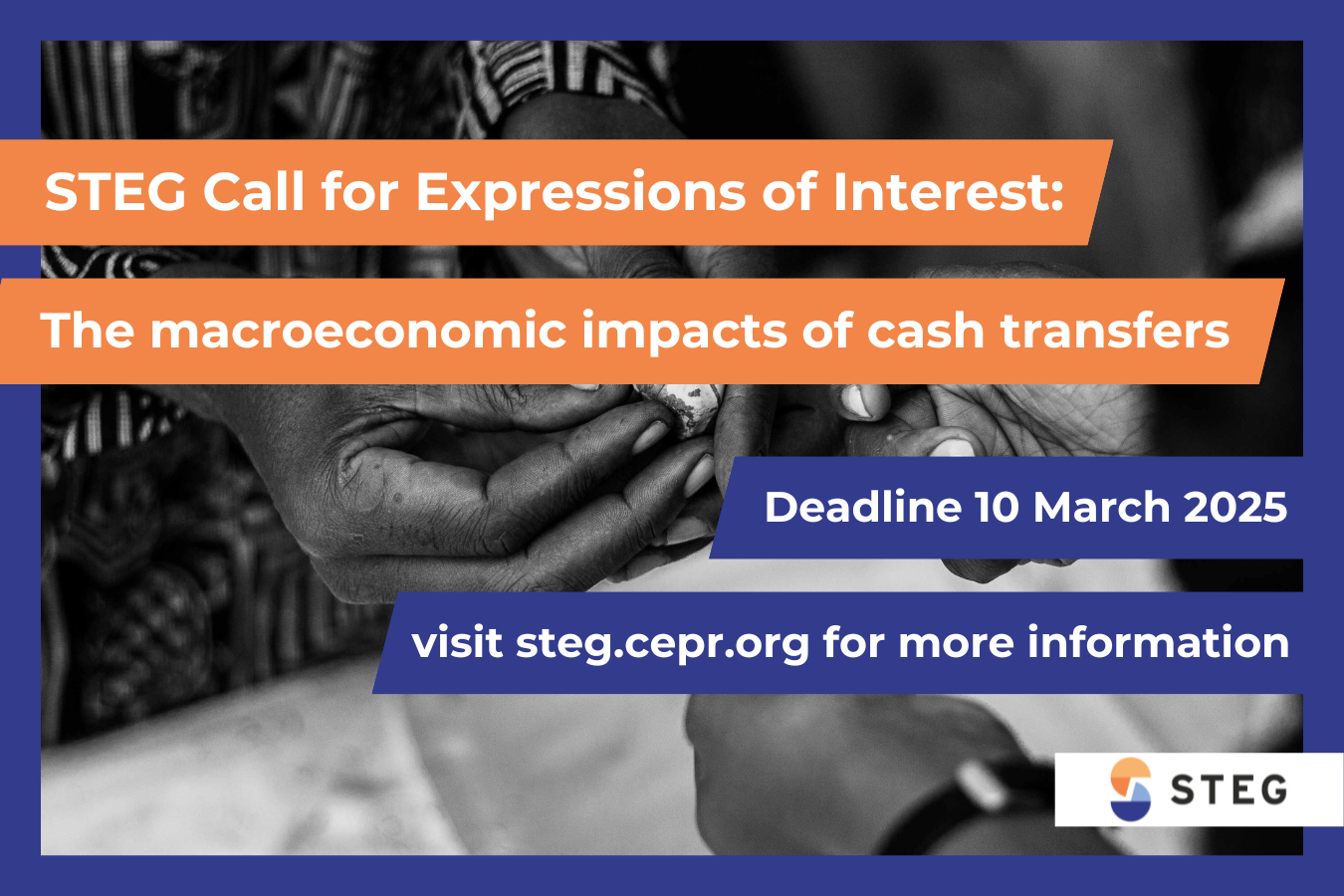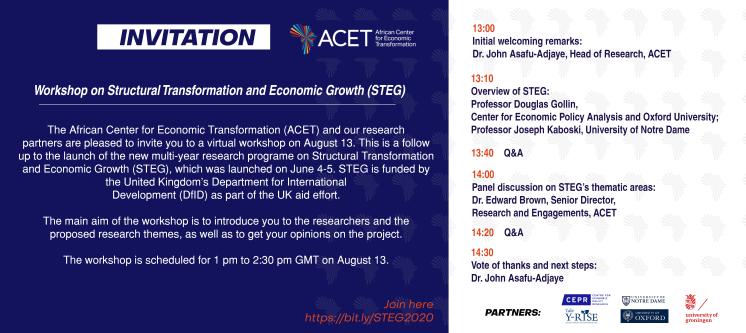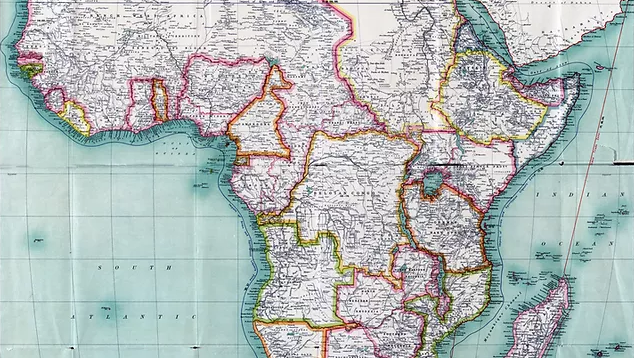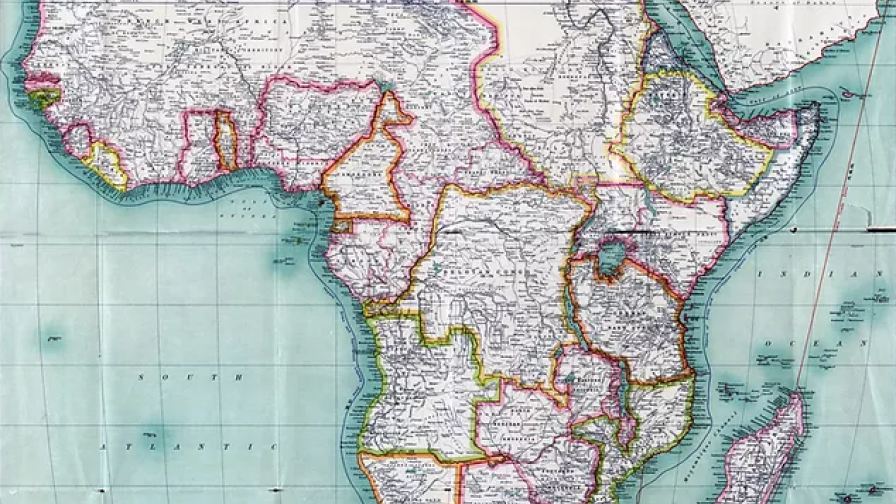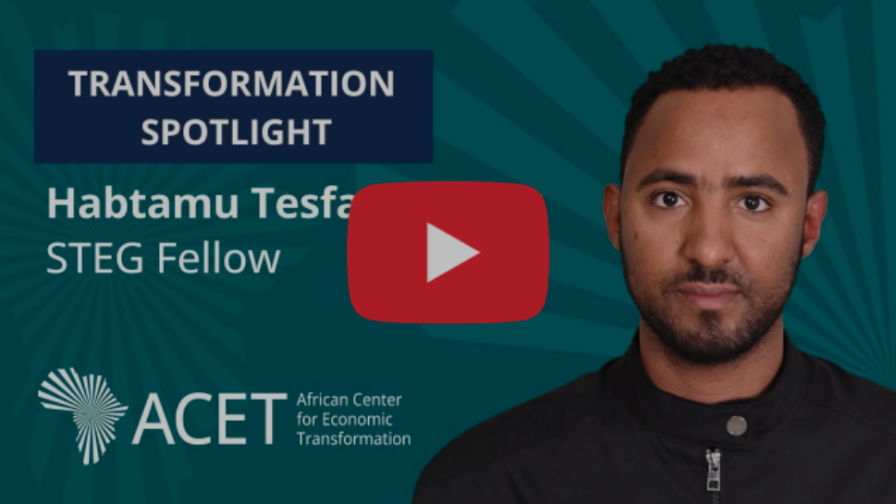STEG invites submission of Expressions of Interest (EOI) for research projects to understand the macroeconomic impacts of large-scale cash transfers.
Large-scale development interventions play a growing role in development policy. A particularly relevant example is the use of large unconditional cash transfers. Such programs are increasingly of interest both to philanthropic donors and governments. An example is the rapid expansion of cash transfers to 30M people in South Africa during the COVID-19 pandemic and beyond. In this call for expressions of interest, STEG seeks to fund 6-8 research projects to inform the implementation of an actual large-scale cash transfer that will be implemented by GiveDirectly in Malawi over the next two to three years.
The proposed intervention will be implemented by GiveDirectly in collaboration with the government of Malawi. The program is likely to feature one-time large lump-sum unconditional cash transfers to eligible adults within different villages; the cash transfers will be delivered through mobile money. Give Directly approached STEG in an effort to gain insight into potential macro impacts that should be considered in program design and implementation. The STEG-funded studies may also be used to shape the randomization strategies and data collection methods of this intervention, in order to maximize the knowledge that can be gleaned about the impacts of the program, both micro and macro, of the program.
To evaluate the effects of this policy, GiveDirectly is committed to randomize the timing of the receipt of such transfers at both the individual and the regional level. The transfer size is expected to be large: about $550 per adult. This implies transfers will represent 100 to 150% of local GDP of most villages that are treated under the program. GiveDirectly and stakeholders are considering the possibility of additional cross-cutting interventions, including, e.g. climate-smart agriculture interventions, or health or community investments. The ultimate ambition of GiveDirectly and the governments of Malawi is to give cash transfers to every person living in extreme poverty within both countries – a total of approximately 10 million people over the next decade, with the transfer size approaching 25% of national GDP. Naturally, the final scope of the program and therefore the speed at which transfers will roll out will depend on fundraising efforts and operational capacity.
The projects funded by STEG will play a role in shaping and evaluating this intervention. By being part of this initiative before the actual intervention will happen, we hope that the funded proposals, through their structural modeling, will inform ex ante the strategy of rollout, the unit of randomization, and the data collection. In turn, we will have the opportunity to use the ex post experimental data to evaluate the predictions of the structural analyses used in the STEG-funded projects. Research projects can address (but are not limited to) questions such as
- How might we model the effects of scaled-up programs – beyond the level of individual communities, to encompass entire regions or even countries?
- What are the overall welfare effects of such initiatives, once general equilibrium effects and distributional implications are specifically taken into account?
- What kinds of data might need to be collected to support the development of macro models or structural analyses?
- What methodological tools are needed to combine experimental approaches with structural or macro-modeling?
- How would we evaluate the usefulness – or even the “accuracy” – of such models?
- Should we aim to discipline the ex-ante processes of model selection and design, akin to pre-analysis plans for empirical work? If so, how should this be done?
Grant Set-up:
The grants available have a budget limit of £20,000. These grants can fund research assistance, travel costs, and (if necessary) teaching buyouts for the principal investigator. Please note that cost-effectiveness and value for money are important evaluation criteria and costs considered unreasonable may result in a lower proposal rating. Please refer to the budget guidelines for further guidance on research stipends.
Projects typically run for 12 months. Please note that contracts should be signed within one month of the outcome notification, which is also the expected start date for the projects. Grants are designed to be contracted directly with individual researchers. The individual researcher will be responsible for receiving, spending and reporting on funds. There should be no institutional involvement. In exceptional circumstances and with significant justification contracts can be drafted with the individual's institution, but these are non-negotiable and the institution cannot take any overhead fees. For further information on STEG’s standard Small Research Grants, please consult the FAQs.
Expected output:
We particularly encourage projects that aim to (i) produce research outputs in terms of working papers and publications and (ii) participate in the broader discussion about the planning and implementation of said cash-transfer.
- In terms of research output, funded projects will be part of the overall GiveDirectly initiative and will have access to the data gathered by the intervention.
- In parallel to this call for Expressions of Interest, there will be a Carnegie-Rochester-NYU conference in April 2026 on the same topic. The proceedings of this conference will be published in the special issue of the Journal of Monetary Economics. Editors of this special issue are George Alessandria, Joe Kaboski, Fernando Parro, and Mike Waugh, and Receipt of this STEG grant is no guarantee to be part of the Carnegie-Rochester-NYU conference but submissions are encouraged.
- An early stage workshop in Malawi will take place in July/August 2025. The workshop will focus on presenting early-stage work / visions from funded participants and will offer a chance to engage with stakeholders (including central bank, governments, GD, etc.), visit the study area, and an opportunity to discuss ways to incorporate early-stage analyses and thinking into program rollout, data collection, and the finalization of the randomization strategy.
Deadline:
This grant call has a two-stage process. In the first stage, we invite expressions of interest (EOIs). Successful proposals will be invited to submit a full proposal with a budget in the second stage.
The EOI should be in the form of a one-page Extended Abstract plus references and must be submitted before a formal application. The EOI should clarify how the project aims to (i) use structural work to quantify the macroeconomic impacts of cash transfers, (ii) exploit the experimental intervention to discipline the model and (iii) how the project can give guidance on how the intervention should be designed and what data should be collected. The EOI should also provide an estimated total budget.
EOIs should be submitted by 10th March 2025 to [email protected]. We will not be able to consider EOIs received after the deadline. Please note that substantive feedback will not be provided at the EOI stage, prospective applicants will only receive an indication of whether they can submit a full proposal. If invited to submit a proposal following a review of the EOI, full applications should be submitted by 21st April 2025. More information on how to apply as well as access to the online application form are available here. Kindly note - submissions must use the special SRG Proposal template for this call, which can be found here.
If you have any questions, please contact the STEG Team at [email protected].
